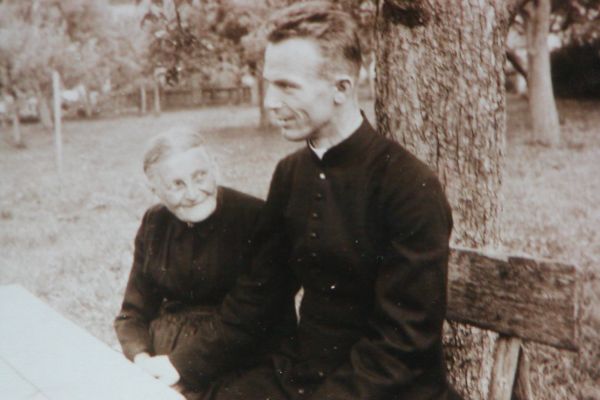The Austrian priest Santiago Gapp never hesitated to criticize in his homilies the racism of the Nazis and their leader Adolf Hitler after the annexation of Austria to the Third Reich. Pursued by the Gestapo, he escaped to Spain. There he was discovered, in Valencia, by two agents of the Reich's secret police. Two years later he died beheaded in Berlin.
The Marianist community celebrated on Tuesday, August 13, its liturgical feast with masses in his honor, after the whole Gapp figure has been presented "as a model of faith" throughout the school year, according to the congregation. They pointed from the Archbishopric of Valencia.
In the last year, El Pilar school - where the religious taught German between 1941 and 1942 and in which a relic of his is kept - has hosted the official premiere of the documentary Santiago Gapp, the priest who faced Hitler , from Valencian filmmaker Manuel Cabo and co-produced with the Marianists, about the life of the Austrian Blessed and recorded in Germany, Austria, France and Spain. It includes interviews with expert historians and religious of the Marianist congregation.
It is based on the biography Santiago Gapp, passion for the truth against Nazism , written by the Marianist priest José María Salaverri, who died in February 2018, who was professor and director of the El Pilar school.
Gapp was born in Wattens (Austria) in 1897 and after fighting in World War I in the Austrian army , he joined the Company of Mary and was ordained a priest. His blunt homilies against Hitler's racism, which had annexed Austria to the Third Reich, raised him as a true hero, admired by those who rejected Nazi barbarism.
He had to flee his country persecuted by the Gestapo, in 1939. After passing through Bordeaux he arrived in Valencia in 1941 , where he was welcomed by the Marianist community of Colegio del Pilar. There he worked as a chaplain and was given the German and Latin classes.
A few months later, in 1942, two young Germans who claimed to be Jewish brothers also persecuted by the Nazis showed up at the Pilar school and asked for help from the Austrian priest. It was established between them what appeared to be a solid friendship to the point that the young people begged him to instruct them in the Catholic faith to receive Baptism.
Days before the scheduled date for the baptismal sacrament, Gapp was invited by his two friends to travel to San Sebastián to receive relatives. From there, through deception, he was sent to Hendaye, already in France , where he was captured by Gestapo agents, the German secret police to which the two false Jews belonged.
Driven to Paris and then to Berlin, where he continued his profession while he was tortured, he was finally beheaded on August 13, 1943 after being sentenced to death by a popular tribunal.
Hours before his execution, in the Plötzensee prison in Berlin, Gapp wrote a farewell letter to his family members with his last textual words: «I was sentenced to death on July 2, the feast of the Sacred Heart. Today the sentence will be executed. At 7 pm, I will go to my dear Salvador's house, whom I always loved fervently. Do not grieve for me! I am totally happy. Naturally I had to spend many painful hours, but I was able to prepare myself very well for death. Have courage, and endure everything for the love of God, so that we can meet again in heaven.
The case of Santiago Gapp " impressed Heinrich Himmler himself , head of the Gestapo, who assured his collaborators that" with a million Jakobs Gapp, but from our ideology, we would dominate the world ", as his biographer, the priest José María Salaverri.
There is also the circumstance that in his subsequent beatification process, one of the testimonies that was given to the Congregation for the Cause of the Saints of the Vatican was that of one of the Nazi torturers themselves , the former Protestant pastor Karl Neuhaus. Pope John Paul II beatified Santiago Gapp on November 24, 1996 and arranged for his liturgical date to be celebrated on August 13, the day of his martyrdom.
According to the criteria of The Trust Project
Know more- Valencia
- Valencian Community
- Religion
Society Justice leaves 70% of Valencia's tourist apartments out of the law
Culture Art in self-defense
CiudadValencia will inject seven million in El Cabanyal to avoid the sanction of the EU

